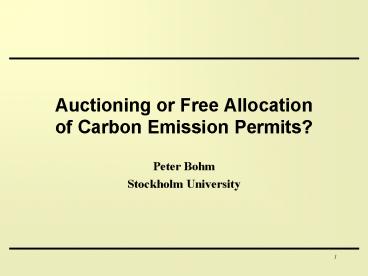Auctioning or Free Allocation of Carbon Emission Permits
1 / 9
Title:
Auctioning or Free Allocation of Carbon Emission Permits
Description:
Total distribution effects of A and FA cannot be compared until the use of ... FA to existing firms discriminates against new firms and hence reduces productivity ... –
Number of Views:37
Avg rating:3.0/5.0
Title: Auctioning or Free Allocation of Carbon Emission Permits
1
Auctioning or Free Allocation of Carbon
Emission Permits?
- Peter Bohm
- Stockholm University
2
Who Gets Free Permits?(FF fossil fuel)
FF Producers
FF Importers
1
2
Refineries
3
Wholesale dealers
4
Retailers
5
FF using firms
Households
6
3
Distribution aspects
- - Parties that receive FA typically
undercompensated, but may be
overcompensated - Affected parties not given any permits
- tend to be at least as worse off as under A
- - Total distribution effects of A and FA cannot
be compared until the use of auction revenue has
been determined - - FA may be given to parties other than those
who are permit-liable (FA free allocation,
e.g. Grandfathering A auctioning)
4
Who Are Permit Liable?And Who Gets Free Permits?
FF Producers
FF Importers
1
2
Refineries
3
Wholesale dealers
4
Retailers
5
FF using firms
Households
6
5
Efficiency Aspects
- - Auction revenue is used most efficiently when
used to reduce distortionary taxes - - FA to existing firms discriminates against new
firms and hence reduces productivity - FA tends to make real investment allocation less
efficient - FA allows inefficient firms to remain in
business
6
What is the (marginal) emissions cost difference
of between FA and A?
Marginal costs (MCs) under FA at least as
high as under A, since to increase emissions,
you either have to buy permits or avoid selling
permits and, if efficiency were the same, permit
prices and MCs would be the same The
essential difference between FA and A is with
respect to the transfer of permit wealth
7
To protect a countrys international
competitiveness, is it necessary to copy other
countries FA?
- - Auctioning does not raise MCs of its export
and import-competing industries more than FA
does. - In fact, MCs in these industries tend to be
lower, since efficiency is higher with A - - Auctioning would hardly make firms move to
other countries where similar firms get FA
8
Summing up
- A does not make marginal emissions more costly
than FA does - A has equal or smaller effects on international
competitiveness - A transfers money to government which allows a
reduction of distortionary taxes which also has
some compensation effects - Also in other respects, A is at least as
efficient for the overall economy - The business community is lobbying against A -
even though only part of this community is
favoured by FA and- a deal can be made to use
part of A revenue for compensation (at least
initially)
9
Summing up
- A does not make marginal emissions more costly
than FA does - A has equal or smaller effects on international
competitiveness - A transfers money to government which allows a
reduction of distortionary taxes which also has
some compensation effects - Also in other respects, A is at least as
efficient for the overall economy - The business community is lobbying against A -
even though only part of this community is
favoured by FA and- a deal can be made to use
part of A revenue for compensation (at least
initially)































